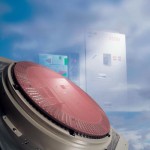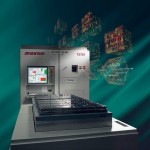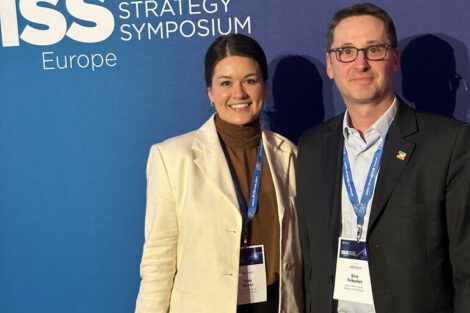Consumers nowadays demand functionality and mobility. They purchase devices that are light and robust enhancing their quality of life. MP3 players, GPS systems and mobile telephones are widely spread and well used giving users the ability to carry on working or playing when outside the workplace gaining access to data or information that was traditionally only available at a fixed point.
All of these innovations are made possible by the availability of non-volatile flash memories that store large amounts of data in compact chips that consume low power and being non volatile retain stored data when switched off. Currently, two kinds of flash memories are available, those being NOR and NAND flash which are distinguished by different cell technologies. NAND flash offers large capacities to store data and is typically used in memory cards and appliances to store large files like MP3, digital pictures and video clips. NOR flash supporting random access is typically faster than NAND flash that is used in applications like computing and mobile phones.
Consumer markets being strongly competitive, flash makers have to produce devices with larger and larger capacities while offering competitive prices. This situation forces them to continually focus on implementation of the smallest available process and continual cost reduction. As devices grow in capacity while being manufactured in smaller technologies the test challenges grow and inevitably test times increase. Flash makers can not afford that test costs grow proportionally. For that reason a number of approaches are being undertaken to offset or reduce testing costs. By testing devices high parallel, test time increases can be offset and cost reduced. DFT/BIST can reduce respectively minimises the tester resources that are dedicated per device and can further increase the parallel test count per system.
Trend to multi chip modules
As space is premium in devices like mobile phones, multi chip modules (MCP) have become a common solution to address this issue. MCP contains a number of components, typically NOR flash, NAND flash and DRAM that are required specifically for the end application. It is important keeping an eye on cost that these modules are manufactured obtaining highest possible yields. All components used should be tested to a high confidence level prior to assembly to reduce the risk that the final module fails. This means that when possible full and comprehensive final tests are completed on the dies used in the module before final assembly. Known good die testing has to be performed on the die to ensure that the device conforms to the given specification.
Solutions for flash testing
Advantest is a market leader in memory testing and offers a comprehensive portfolio of equipment for flash testing:
Flash wafer tester
T5761 is a wafer testing platform dedicated for wafer test of flash memories supporting high parallel test of components and lowers test time by flash dedicated testing functions. The system is equipped with 256 independent test sites enabling wafer test up to 66 MHz. An engineering system equipped with 4 sites is available for program generation, debug and characterisation use. Each site is equipped with an algorithmic pattern generator and with vector generation capability. For memory repair the system has full fail capture memory functionality and hardware accelerators to optimise the repair calculation time. The system embraces the trend in the market enabled by high parallel probe cards towards single touch / full contact probing as it is equipped with a large interface and mechanical stabilisation equipment to support full contact probing of 300 mm wafers. The system resources also make full contact testing feasible, allowing the test of up to 512 devices in parallel. Enabling full contact probing at high parallel counts and optimising test time by dedicated tester functionality, the platform contributes to lowering test costs significantly.
DRAM, flash and MCP tester
T5588 is a flexible platform for packaged devices that covers a wide variety of devices including DRAM, NAND flash, NOR flash and MCP. The two station system offers low testing cost by supporting parallel test of up to 512 devices per station. The system offers a frequency range up to 400 MHz (800 Mbps) which is achieved by a production friendly automatic calibration routine. The system has full flash testing capability, compatible with the T53xx family. The company offers a complete test cell including the M6241 handler and device interfacing products. The tester offers low test costs and gives manufacturers flexibility to cover different device types with a single flexible platform. This system is targeted at manufacturers that need such flexibility to switch between device types.
Multi chip and flash component tester
T5781 is a versatile tester targeted to test flash components and MCP modules. The tester enables test of flash components up to 512 parallel and is available as a packaged device tester or a wafer test platform. Future MCP will contain components that function at 266 MHz (533 Mbps), for that reason T5781 covers test frequencies up to 286 MHz (572 Mbps) and can test DRAM devices. It is equipped with 128 independent test sites that can be utilised to test a number of devices per site or linked together to solve the need to test large pin count devices. An engineering system is available for program generation, debug and characterisation and reproduction test. Each site has an algorithmic pattern generator and logic testing capabilities. As MCP can have varying pin counts, the system has a pure IO structure and reallocation of test resources during testing is possible. This enables the system to offer lowest test costs when testing MCP by optimising the parallel test count for actual devices under test. As a pure flash component tester, the system offers lowest cost of test by efficient high parallel testing. The tester is available as a final test solution docked to M6241 handler or as a wafer test solution to perform wafer test and/or KGD.
Conclusion
All these memory test systems are test program compatible enabling an easy exchange or share of test programs between platforms. The company offers optimal test solutions for MCP and flash testing on wafer or in package. Due to the wide product portfolio and the varying test approaches adopted the line up of solutions can be adapted to meet customer’s own needs thus offering lowest costs.
EPP Europe 451
zusammenfassung
Das Unternehmen bietet Testlösungen für den Test von MCP (Multi Chip Modules) und Flash-Speichern auf Wafern oder in Gehäusen. Die im Beitrag vorgestellten Testsysteme sind testprogrammkompatibel und ermöglichen einen leichten Austausch sowie die gemeinsame Nutzung von Testprogrammen zwischen mehreren Plattformen.
L’entreprise propose des solutions pour le test de MCP (Multi Chip Module) et de mémoires flash sur des tranches ou dans des boîtiers. Les systèmes de test présentés dans l’article sont compatibles avec les programmes de test, permettent un remplacement facile ainsi que l’utilisation commune de programmes de test entre plusieurs plateformes.
L’azienda offre soluzioni per il test di MCP (Multi Chip Module) e di memorie flash su Wafer o in alloggiamenti. I sistemi di test presentati nell’articolo sono compatibili con il programma di test e consentono facilmente lo scambio o la condivisione di programmi di test tra più piattaforme.
Share:












